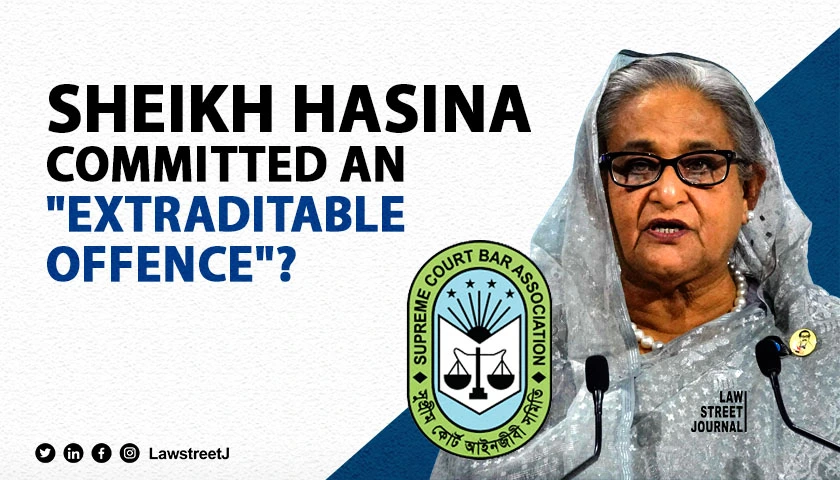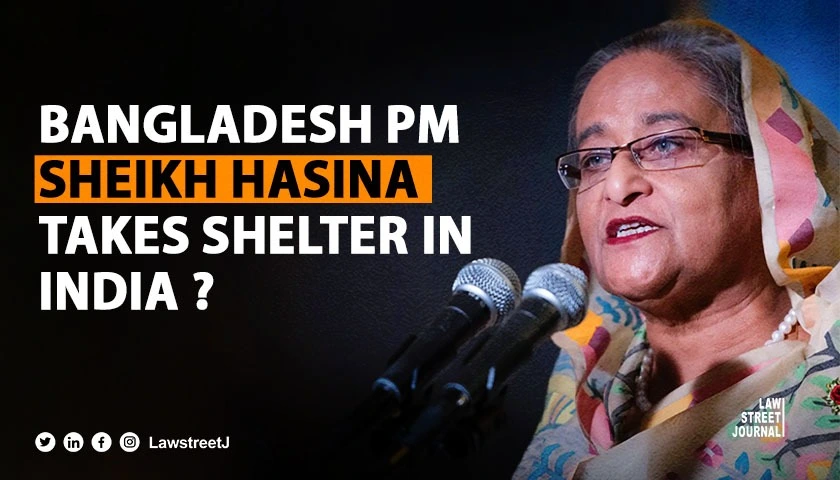New Delhi: Former Supreme Court Bar Association president and senior advocate Adish C Aggarwala has written a letter to the president of the apex court bar association in Bangladesh, seeking information on whether the country's former prime minister, Sheikh Hasina, had committed an "extraditable offence".
The former chief has also requested the Bangladesh SCBA president to ensure that Hindus are not intentionally targeted during a turmoil in the neighbouring country.
The letter, addressed to AM Mahbub Uddin Khokon, says the legal fraternity of both countries work closely.
"I read in news reports that it has been urged by you in the capacity of President of Supreme Court Bar Association of Bangladesh that India should arrest the former Prime Minister of Bangladesh, Sheikh Hasina, and her sister, Sheikh Rehana, and return them to Bangladesh," the letter reads.
It points out that according to the 2013 extradition treaty between both countries, it is mandatory that there is an "extraditable offence".
"There is no news report that Sheikh Hasina and her sister have been charged in any criminal case. However, if you claim that Sheikh Hasina and her sister have been charged with any offence and if the government of Bangladesh has made an extradition request to the Indian government, then kindly provide the said information to me immediately, so that we can also impress upon the government of India to extradite them to Bangladesh," said Dr. Aggarwala, who is also Chairman of All India Bar Association and former Vice-Chairman of Bar Council of India.
"The bar is the protector of human rights. There are press reports that houses and businesses of Hindus, as well as temples, have been targeted, looted, damaged during the ongoing turmoil in Bangladesh. I also take this opportunity to request you to ensure that Hindus are not intentionally targeted in Bangladesh," it says.
I read in news reports that it has been urged by you in the capacity of President of Supreme Court Bar Association of Bangladesh that India should arrest the former Prime Minister of Bangladesh Ms. Sheikh Hasina and her sister, Ms. Sheikh Rehana, and return them to Bangladesh.
It has been further reported that at a press conference held at the SCBA Auditorium, you stated, "We want to maintain a positive relationship with the people of India. Please arrest Sheikh Hasina and Sheikh Rehana, who fled the country, and send them back to Bangladesh," the letter states.
The letter refered to the ‘Treaty between India and Bangladesh relating to Extradition’ which was signed at Dhaka on 28.01.2013 which was ratified on 23.10.2013.
The relevant Articles of the Extradition Treaty, makes it mandatory that for extradition, a person should be a person ‘who have been proceeded against for or have been charged with or have been found guilty of, or are wanted for the enforcement of a judicially pronounced penalty for committing an extraditable offence’, it further reads.
“There is no news report that Ms. Sheikh Hasina and her sister Ms. Sheikh Rehana have been charged in any criminal case However, if you claim that Ms. Sheikh Hasina and her sister Ms. Sheikh Rehana have been charged with any offence and if the government of Bangladesh has made an extradition request to Indian government, then kindly provide said information to me immediately, so that we can also impress upon the government of India to extradite them to Bangladesh,” it underlined.
Extracts of the ‘Treaty between India and Bangladesh relating to Extradition’ (2013):
ARTICLE 1 : OBLIGATION TO EXTRADITE
1. The Contracting States agree to extradite to each other, subject to the provisions of this Treaty, persons found in the territory of one of the Contracting States who have been proceeded against for or have been charged with or have been found guilty of, or are wanted for the enforcement of a judicially pronounced penalty for committing an extraditable offence, as described in Article 2, by the judicial authority of the other Contracting State.
ARTICLE 2 : EXTRADITION OFFENCES
1. An extradition offence for the purposes of this Treaty is constituted by conduct which under the laws of each Contracting State is punishable by a term of imprisonment for a period of at least one year.
ARTICLE 6 THE POLITICAL OFFENCE EXCEPTION
(1) Extradition may be refused if the offence of which it is requested is, an offence of a political character.
(2) For the purpose of this Treaty, the following offences shall not be regarded as offences of a political character :
(a) any acts or omissions which are punishable as a criminal offence according to the obligations under multilateral treaties to which both contracting States are party
(b) murder;
(c) manslaughter or culpable homicide;
(d) assault occasioning actual bodily harm, or causing injury, maliciously wounding or inflicting grievous bodily harm whether by means of a weapon, a dangerous substance or otherwise;
(e) the causing of an explosion likely to endanger life or cause serious damage to property;
(f) the making or possession of an explosive substance by a person who intends either himself or through another person to endanger life or cause serious damage to property;
(g) the possession of a firearm or ammunition by a person who intends either himself or through another person’s to endanger life;
(h) the use of a firearm by a person with intent to resist or prevent the arrest or detention of himself or another person;
(i) damaging property whether used for public utilities or otherwise with intent to endanger life or with reckless disregard as to whether the life of another would thereby be endangered;
(j) kidnapping, abduction, false imprisonment or unlawful detention, including the taking of a hostage;
(k) incitement to murder;
(l) any other offence related to terrorism which at the time of the request is, under the law of the requested party, not to be regarded as an offence of a political character;
(m) an attempt or conspiracy to commit any of the foregoing offences or participation as an accomplice of a person who commits or attempts to commit such an offence.








![CJI cites Bangladesh to highlight importance of liberty [Read Speech]](/secure/uploads/2024/08/lj_1548_CJI_Bangladesh.webp)







